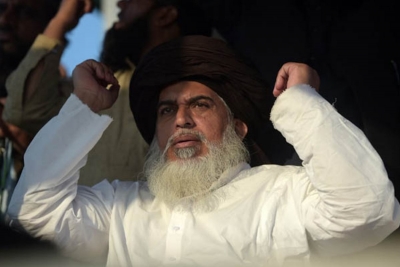By Aarti Tikoo Singh
New Delhi, Nov 26 (IANS) Twelve years after the 26/11 Mumbai terror attacks, the Pakistan province of Punjab – the place where the attacks were plotted – is imploding.
The province is in the grip of Islamist fundamentalism which was until recently led by a cleric named Khadim Hussain Rizvi, the founder of Tehreek-e-Labbaik Pakistan (TLP), an extremist organisation which believes in the execution of “blasphemers” of Islam.
The wheelchair-bound cleric along with thousands of his supporters recently held protest demonstrations in Islamabad demanding the Imran Khan government to sever Pakistan’s diplomatic ties with France over the fresh controversy related to the publication of cartoons of Prophet Mohammad. Given the popularity of the movement, the Khan government under pressure signed an agreement with TLP that it will cut off its relations with France after the National Assembly approved it in three months.
Mysteriously, Rizvi died at the age of 54 on November 19. After his burial, his son, Hafiz Saad Rizvi, with an equally massive following as his father, vowed to carry forward Rizvi’s mission against “blasphemy”.
What connects Rizvis with the perpetrators of the Mumbai terror attacks — the mastermind and chief of Lashkar-e-Taiba Hafiz Saeed, terrorist Ajmal Kasab, Lashkar operatives David Coleman Headley and Tahawwur Hussain Rana — is the Punjab province of Pakistan. Not only are all of them from the same province, but all share the same fundamentalistic zeal for Islam and issues related to blasphemy.
While Headley and Rana were affiliated to Lashkar-e-Taiba, which follows the hardline Deobandi school of Islam, Rizvis are Barelvis, once deemed Islam’s moderate strain. But the extremist face of Barelvis got exposed in Pakistan when Khadim Rizvi backed Mumtaz Qadri who had assassinated Punjab’s governor Salman Taseer for supporting Asia Bibi, a Christian woman who had been wrongly jailed for alleged blasphemy against Islam. When Qadri was convicted, Khadim Rizvi led a mass movement for his freedom. After he was hanged in 2016, Qadri got a massive funeral, shocking the whole world. The movement culminated in the creation of TLP.
Interestingly, Headley and Rana, apart from planning the Mumbai terror attacks against India, were also driven by the same issue of blasphemy. At the direction of Lashkar, both planned a terror attack against Danish newspaper Jyllands-Posten, which had published 12 cartoons of Prophet Mohammad in 2005. The cartoons led to protests, including violence by Muslims world wide.
The recent Khadim Rizvi-led renewed movement against “blasphemy” was triggered after a French teacher showed caricatures of the Prophet in a class discussion on free speech. The teacher was beheaded by an Islamist student, drawing global condemnation. French President Emmanuel Macron not only stood by the teacher and France’s freedom of expression, he made it clear that his country will not tolerate Islamist radicalism.
Even Pakistan Prime Minister Imran Khan is on the same page as Headley, Rana and Khadim Rizvi on the issue of blasphemy. He was critical of France and warned that “blasphemy” against Islam can’t be committed under the garb of free speech.
Insiders in Pakistan say that Islamic radicalisation has reached its peak in Punjab province.
“This is a result of Pakistan Army’s repeated use of religious fundamentalists of different sects in Punjab province for its own strategic goals against India. All the hard liner schools, Deobandi, Jamaat-e-Islami and Ahl-e-Hadith, were used to create terror groups in Punjab province aimed at India in Kashmir. All their chiefs and terror camps for Kashmir remain intact even as there has been so much international pressure.
“But since 26/11, it has been the Barelvis, over 50 per cent of the population in Pakistan, who are driving Islamic fundamentalism within Pakistan. This is tearing apart the heart of Pakistan, that is Punjab,” a journalist from Lahore told IANS.
Majority of Pakistan’s top Army officers are also from the Punjab province.
–IANS
aat/arm

